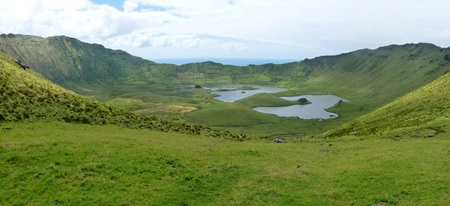The colonization of the Azores began seven hundred years before the arrival of the Portuguese

The first settlers in the Azores Islands arrived seven hundred years before the first Portuguese arrived there in the 15th century as stated in the official historiography. This is one of the main conclusions of a study carried out by an international and multidisciplinary team in which the experts Alberto Sáez and Olga Margalef, from the Department of Earth and Ocean Dynamics of the Faculty of Earth Sciences of the UB, ─have taken part.

The first settlers in the Azores Islands arrived seven hundred years before the first Portuguese arrived there in the 15th century as stated in the official historiography. This is one of the main conclusions of a study carried out by an international and multidisciplinary team in which the experts Alberto Sáez and Olga Margalef, from the Department of Earth and Ocean Dynamics of the Faculty of Earth Sciences of the UB, ─have taken part.
The study, published in the journal PNAS, reconstructs how, when and under which climate conditions the Azores were inhabited for the first time and the impact these first human settlements had on the ecosystems using the analysis and dating of the sediments taken from the lakes of the islands. The research team suggests that these early settlers came from northern Europe and that they would have taken benefit of favourable climate conditions to sail to these volcanic islands, located 1,450 kilometres away from the European coasts.
To date, the consensus had been that the Azores had been uncolonized until the arrival of the Portuguese. According to the available historical sources, the Portuguese arrived in the island of Santa Maria in 1427 and the Flores and Corvo islands in 1452 looking for new routes to India. The now published paper puts the arrival of the first colonizers of the island at the end of the Early Middle Ages, between 700 and 850 of our era.
According to Alberto Sáez, professor of Stratigraphy of the UB and one of the authors of the article, “the study highlights that we need to foster and complement the historical information with interdisciplinary research among humanities and natural sciences in order to find and have a very accurate picture of our history”.
The team dated and analysed ─using geological, chemical, physical and biological techniques─ five sediment cores recovered from the lakes of the islands of Sao Miguel, Pico, Terceira, Flores and Corvo. They detected the presence of sterols, a fraction of the organic matter abundant in the mammal faeces, and coprophilous fungal spores, which they considered indicators of human presence.
“Bowels of mammals produce faecal sterols and stanols in abundance and these are well-preserved in lacustrine sediments, and they are a unique and clear indicator of the presence of large mammals in certain periods of past time intervals”, note Santiago Giralt (GEO3BCN-CSIC), Roberto Bao (University of La Corunya) and Timothy Shanahang (University of Texas at Austin), co-authors of the study. “Moreover, the compounds produced by human guts (rich in coprostanol) and farming (rich in stigmastanol) are different, which allows us to distinguish one from the other”.
“Due to its geographical location, in the centre of the Atlantic Ocean, the Azores Islands were not populated by large mammals. Therefore, the appearance of coprostanol in sediments can be related to human presence, and finding stigmastranol can be attributed to ruminants, such as cows, goats or sheep”.
Analysis of pollen, fossils and carbon particles
The team has characterized the impact of the first human populations on the ecosystems of the islands with the study of pollen, fossil fragments of plants and carbon particles present in the sediments.
“As shown in this study, the early human occupation of the islands brought an ecological and environmental alteration. Although historical sources describe the Azores as deeply forested and pristine, the study highlights the difficulty of relying on the historical records to identify certain states of alteration of the ecosystem and landscape”, notes Pere Raposeiro, researcher at the University of the Azores and first author of the article.
The authors of the study carried out several simulations of atmospheric and oceanic conditions to determine the winds that were predominant in the past and under which the early colonization of the archipelago took place. According to these simulations, and to previous other archaeological and genetic studies, they suggest that the first inhabitants came from northen European and north-eastern European areas. These peoples found during the end of the Early Middle Age favourable climate conditions to travel to the Azores, due to the prevalence of northern-eastern winds and weakened western winds.
“Due to the rotation of the Earth, westerly winds dominate the Atlantic Ocean, and these are stronger or weaker depending on the North Atlantic Oscillation (NAO), the main climate mode that controls the atmospheric circulation in the northern hemisphere. NAO is modulated by the East Atlantic pattern (EA), which controls the intensity of northerly winds”, notes Sáez.
Apart from counting on the participation of the experts of the UB and other institutions, the study counts on the collaboration of scientists from other national and international research institutions such as the Centre for Research on Ecology and Forestry Applications (CREAF), experts from the Royal Netherlands Institute for Sea Research (NIOZ, the Netherlands), Brown University (United States), the Portuguese Institute for Sea and Atmosphere (Portugal), the Institute Dom Luiz of the University of Lisbon (Portugal), University of Amsterdam (Netherlands), University of Bern (Switzerland) and the Edith Cowan University (Australia).
Reference article:
Pedro M. Raposeiro et al. «Climate change facilitated the early colonization of the Azores Archipelago during medieval times». PNAS, October 2021. Doi: 10.1073/pnas.2108236118
